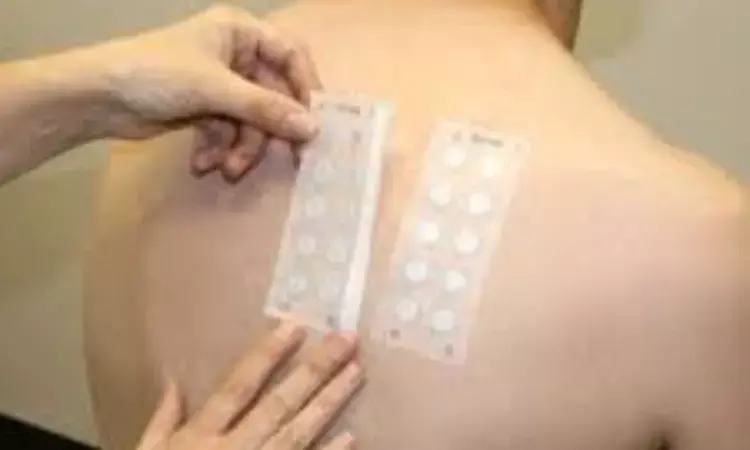- Home
- Medical news & Guidelines
- Anesthesiology
- Cardiology and CTVS
- Critical Care
- Dentistry
- Dermatology
- Diabetes and Endocrinology
- ENT
- Gastroenterology
- Medicine
- Nephrology
- Neurology
- Obstretics-Gynaecology
- Oncology
- Ophthalmology
- Orthopaedics
- Pediatrics-Neonatology
- Psychiatry
- Pulmonology
- Radiology
- Surgery
- Urology
- Laboratory Medicine
- Diet
- Nursing
- Paramedical
- Physiotherapy
- Health news
- Fact Check
- Bone Health Fact Check
- Brain Health Fact Check
- Cancer Related Fact Check
- Child Care Fact Check
- Dental and oral health fact check
- Diabetes and metabolic health fact check
- Diet and Nutrition Fact Check
- Eye and ENT Care Fact Check
- Fitness fact check
- Gut health fact check
- Heart health fact check
- Kidney health fact check
- Medical education fact check
- Men's health fact check
- Respiratory fact check
- Skin and hair care fact check
- Vaccine and Immunization fact check
- Women's health fact check
- AYUSH
- State News
- Andaman and Nicobar Islands
- Andhra Pradesh
- Arunachal Pradesh
- Assam
- Bihar
- Chandigarh
- Chattisgarh
- Dadra and Nagar Haveli
- Daman and Diu
- Delhi
- Goa
- Gujarat
- Haryana
- Himachal Pradesh
- Jammu & Kashmir
- Jharkhand
- Karnataka
- Kerala
- Ladakh
- Lakshadweep
- Madhya Pradesh
- Maharashtra
- Manipur
- Meghalaya
- Mizoram
- Nagaland
- Odisha
- Puducherry
- Punjab
- Rajasthan
- Sikkim
- Tamil Nadu
- Telangana
- Tripura
- Uttar Pradesh
- Uttrakhand
- West Bengal
- Medical Education
- Industry
Study compares patch test positivity: 24 versus 48 hours of occlusion time in allergic contact dermatitis patients

India: A recent prospective study published in Contact Dermatitis compared patch test positivity after 24 and 48 hours of occlusion time in patients with allergic contact dermatitis (ACD).
The researchers reported no significant difference in patch test among ISS allergens after either occlusion time, 48 h occlusion performed significantly better versus 24 h when reactions of all allergens (ISS, parthenium acetone extract, and patient material) are analyzed together.
Allergic contact dermatitis is a common skin disorder characterized by inflammation resulting from exposure to allergens. Patch testing is a valuable diagnostic tool used to identify the culprit allergens. However, the duration of occlusion during patch testing remains a subject of debate among dermatologists.
Conventionally, the patches are applied for 48 hours, which causes excessive sweating in tropical weather conditions, leading to irritation, and sometimes the patches come off, making the test inconclusive. In a recent study, Kaushal Verma, Department of Dermatology and Venereology, All India Institute of Medical Sciences, New Delhi, India, and colleagues sought to compare the patch test positivity after 24 and 48 h of occlusion time in patients of allergic contact dermatitis, using standard allergen concentration.
The study involved clinically suspected allergic contact dermatitis patients and patch-tested using the Indian Standard Series, parthenium acetone extracts (1:50, 1:100, and 1:200 dilutions), and patient material. Using a random number table, patches were applied in duplicate on either side of the back.
One set of patches was removed following 24-h occlusion, while the other set after 48-h. Two independent dermatologists performed the readings at 48- and 96-h, blinder to the duration of occlusion.
The study revealed the following findings:
- 133 and 142 positive reactions were observed after 48 h occlusion at 48 and 96 h reading, respectively. Of these 87.9% and 92.9% patches were positive and concordant and noted at 24 h occlusion time.
- The Cohen's kappa coefficient was 0.94 for 48 h and 0.97 for 96 h reading, showing an almost complete agreement (ⱪ > 0.81) between patches occluded for 24 and 48 h.
"A 24-hour occlusion period may be sufficient for some patch test series (such as the ISS); however, other patch series with different allergens require further assessment with this shorter occlusion time," the researchers wrote.
The implications of these findings are significant for ACD management. By optimizing patch testing protocols, clinicians can enhance diagnostic accuracy, leading to more precise identification of allergens and better management of the condition. This, in turn, facilitates the development of personalized treatment plans tailored to each patient's specific sensitivities.
In conclusion, the comparative analysis of patch test positivity after 24 and 48 hours of occlusion time offers valuable insights into optimizing diagnostic approaches for allergic contact dermatitis.
By considering individual variations in occlusion duration and allergen reactivity, dermatologists can improve the accuracy of patch testing and enhance patient care in managing this common dermatological condition.
Reference:
Ahuja, R., Bhari, N., Sethuraman, G., Kalaivani, M., & Verma, K. Comparison of patch test positivity after 24 and 48 hours of occlusion time in patients of allergic contact dermatitis: A prospective study. Contact Dermatitis. https://doi.org/10.1111/cod.14543
Dr Kamal Kant Kohli-MBBS, DTCD- a chest specialist with more than 30 years of practice and a flair for writing clinical articles, Dr Kamal Kant Kohli joined Medical Dialogues as a Chief Editor of Medical News. Besides writing articles, as an editor, he proofreads and verifies all the medical content published on Medical Dialogues including those coming from journals, studies,medical conferences,guidelines etc. Email: drkohli@medicaldialogues.in. Contact no. 011-43720751


